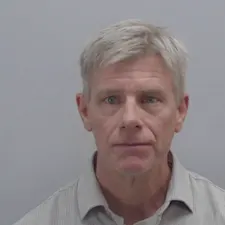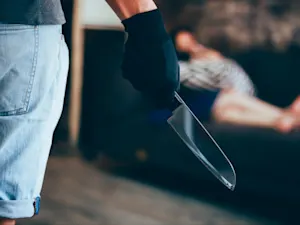
Sinatra, The Mob, and The JFK Affair
Promo still for the 1957 film "Pal Joey," showing Frank Sinatra. Photo by Columbia_Pictures and courtesy of Dr. Macro's High Quality Movie Scans. Public domain.
Frank Sinatra wasn't just a musical legend — he was a force of nature. His velvety voice captivated millions, his swagger even made men jealous, and his charm turned every head in the room. But behind the dazzling lights and roaring applause lurked another Sinatra: the one with a Rolodex® full of mobsters. For decades, whispers of his Mafia ties swirled, and the FBI wasn't just listening — they were taking notes. Thousands of pages of notes, in fact, and here's why.
Why did the FBI keep such a close eye on Sinatra?
The Bureau's obsession with Sinatra started in the 1940s, when rumors flew that the singer had shelled out $40,000 to dodge the draft. Officially, he stayed home due to a punctured eardrum and supposed psychological issues, but the gossip stuck, tarnishing his reputation and drawing government scrutiny.
Then came the friendships. Sinatra didn't just know mobsters — he partied with them, worked for them, and — some say — called in a few favors along the way.
How deep did Sinatra's Mafia connections run?
Take Sam Giancana, the Chicago mob boss who counted Sinatra as one of his closest pals. Sinatra's connections reportedly went deep enough to influence JFK's 1960 presidential campaign. According to accounts, Sinatra introduced Giancana to Kennedy's team, paving the way for union votes to swing in JFK's favor. As a thank-you, Sinatra performed at Giancana's club.

Mob boss Sam Giancana. Photo courtesy of ebay.com. Public domain.
And if the story wasn't already messy enough, Sinatra also introduced Kennedy to Giancana's girlfriend, Judith Campbell Exner, sparking a scandalous affair. Exner later testified before Congress, claiming she served as a go-between for JFK and Giancana during an alleged plot to assassinate Fidel Castro.
Sinatra didn't keep his underworld associations a secret. Photos show him laughing with mobsters at casinos, nightclubs, and lavish parties. He didn't just hang out with Giancana; he mingled with the likes of Lucky Luciano, the Fischetti brothers, and Detroit's Giacalone clan.
According to History.com, retired FBI agent Sam Ruffino once said, "A few times a year, we'd trail the Giacalones to the airport to pick up Sinatra. They'd spend the weekend together socializing before and after his shows. ... Almost every night, they'd shut the place down. And he didn't make any apologies for it. Those were his friends."
Did Sinatra's mob ties ever put him in danger?
Sinatra's big mouth — he loved bragging about how he could call his friends to take care of problems — put him on thin ice with the Mafia.
According to NYPost.com, in one infamous incident he reportedly threatened a Las Vegas pit boss after a drunken night out, yelling, "You're dead!" Sinatra's mob friends questioned the man about the incident, eventually transferring him to Reno to appease Sinatra. The singer, thinking his threat had been carried out, likely felt untouchable. His tendency to name-drop mob hits and throw tantrums drew so much attention that, at one point, the Mafia allegedly considered silencing him for good.
Sinatra wasn't oblivious to the danger. Stories surfaced of him panicking when strangers approached him too quickly, mistaking fans for would-be assassins. Twice, he even tried to become a CIA informant, offering to spill secrets about the British royal family in exchange for protection. The CIA turned him down, reportedly worried he might discover their own dealings with the Mafia and let it slip.
How did Sinatra's mob ties impact his family and career?
The most personal intersection of Sinatra's mob ties came in 1963 when kidnappers snatched his son, Frank Jr. When this happened, Sinatra's first call wasn't to the police. Instead, he rang up Giancana. Although the FBI ultimately resolved the case, Giancana had already mobilized his men, eager to prove his muscle surpassed the government's.
Professionally, Sinatra's mob connections opened doors to influential venues and opportunities. Yet they also cast a shadow over his legacy, with persistent rumors and stories tying him to organized crime. Films such as "The Godfather" fueled the narrative, with Johnny Fontane — a thinly veiled Sinatra stand-in — depicting a singer leaning on mobsters to advance his career.
What do Sinatra's FBI files reveal about his legacy?
Sinatra's FBI files offer a paradoxical portrait. They detail his friendships with criminals and alleged attempts to dodge military service. Yet they also showcase his advocacy for civil rights, opposition to racism and defense of accused Communists during the McCarthy era.
According to History.com, historian Gerald Meyer argued that the Bureau saw Sinatra's liberal activism as a threat, not evidence of actual wrongdoing. Sinatra knew they were watching. By the late 1970s, he even requested his FBI file, flipping through decades of surveillance on a life lived unapologetically.
Frank Sinatra's story reads like a Hollywood script — mob bosses, political intrigue and brushes with danger at every turn. Was he a crooner with a few shady friends or a man who thrived in the gray areas of power and loyalty? Maybe a little of both.
But one thing remains clear: Sinatra never cared what anyone thought. He did it his way.
References: Frank Sinatra's Mob Ties and Other Secrets from His FBI File | How Frank Sinatra tried to save himself when he felt threatened by the mob























